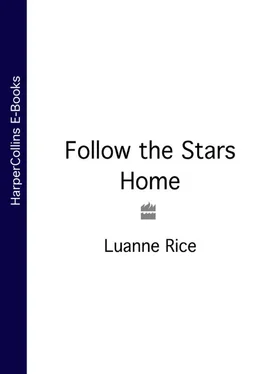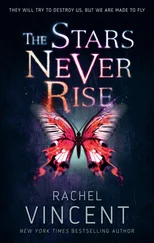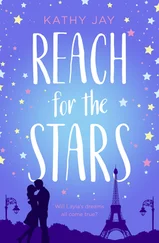“They were my grandmother’s,” Dianne said.
“All your things are … so careful.”
“How?” Dianne asked, tickled by the word.
“Everything is just so. You make things seem like they matter. Beautiful glasses, real cloth napkins, the way you tie your hair with a piece of marsh grass …”
“That’s just because I couldn’t find an elastic,” Dianne said.
“Hmm,” Amy said, glowing as she took a small bite of cookie. Dianne didn’t think of herself as careful: Sentimental was more like it. She liked things to remind her of other people. She had loved her grandmother, and she had loved Tim’s. Dorothea McIntosh had lived in a meadow, and she had tied her hair with long grass and flower stems. She had married a sea captain who brought jewels and rosewood back from a trip to India, and Dianne had her diamond and sapphire earrings tucked safely away.
Dianne held the cup close to Julia’s chin, guided the straw to her lips. The first day, Amy had tried to feed Julia a bite of cookie, and Dianne had had to explain that Julia could choke. She loved the way Amy accepted Julia’s reality without question, without trying to change it, make it better, conform to hers. Amy leaned forward with a napkin to dab away the lemonade that spilled down Julia’s chin.
“Thank you,” Dianne said.
“Rats, don’t thank me,” Amy said, blushing.
“Your mother doesn’t mind you coming over here?”
Amy shook her head.
“Does she work?” Dianne asked, trying to get a feel for what made Amy want to spend the afternoons away from home. Maybe her mother didn’t get home till five or six; probably Amy didn’t like staying in an empty house.
“No,” Amy said, looking down. “She’s home.”
They didn’t say anything for a while after that. There was a rhythm developing to their time together. They didn’t have to do anything to rush it along; it was growing at its own pace. Dianne tried not to ask herself why this meant so much to her, that a twelve-year-old girl from the neighborhood would want to hang around with her and Julia.
Amy was helping her see something. This was how life would be if Julia were normal: a mother and daughter going through their days together. Dianne was a mother with so much to give. Alan had put them together; Dianne was grateful, but sometimes she felt she was already beholden to him for too many things. And he was always there, even when she least expected him.
Last Wednesday she had driven over to the library to drop off her mother’s lunch. From behind the glass partition in the librarians’ office, Dianne spotted Alan jogging up the library’s wide front steps.
“It’s Wednesday,” Lucinda said, following her gaze. “He visits on his day off.”
“I forgot,” Dianne said, holding Julia.
“Just a minute,” Lucinda said. “Be right back.”
Her mother took the towel she had folded on her desk and walked out to the front desk to meet Alan. Rocking Julia, Dianne watched them greet each other. Alan’s T-shirt was soaked, and wet hair hung in his eyes. She half rose, thinking she’d walk out and say hi. This was her chance to thank him for sending Amy over.
Lucinda gestured, beckoning him around the desk. She directed Alan behind a corkboard partition. From behind the glass Dianne watched him glance around to make sure no one was looking. Then he pulled his wet shirt over his head. His body was strong and glistening with sweat. He dried himself off with the towel, and she watched him rubbing the mat of curly dark hair on his chest.
Dianne was frozen in place. She couldn’t move or look away. She felt like a spy, the library voyeur. The blood was pumping to her brain, leaving her mouth open and dry. Alan’s skin was ridiculously smooth, glossy and taut across his muscles. The two young librarians had walked in to have their lunch. They giggled, and Dianne realized they were checking Alan out too. She mumbled a few words.
The pediatrician’s body. She stared at it: his flat stomach, the narrow line of dark hair trailing into his waistband. His thighs looked massive, the rest of his legs long and lean. When he had finished drying himself, he pulled his wet shirt back on. As his head popped through the opening, his eyes met Dianne’s.
She blinked and looked down. The door opened and Lucinda walked in. The younger librarians were teasing her about keeping Alan to herself. Lucinda bantered back. Julia waved her arms, trying to call her grandmother. When Dianne glanced up, remembering that she still hadn’t thanked Alan for sending Amy to them, he had disappeared.
Having finished the little Victorian yesterday, Dianne was beginning a Greek Revival for the seventh birthday of a little girl in Old Lyme. This required building a portico and positioning ionic columns. While Julia dozed, Amy sat on a high stool watching Dianne work. Stella, still unsure about the newcomer, perched in a wicker basket on a shelf, spying from on high.
“Why doesn’t Stella like me?” Amy asked. “Cats usually do.”
“Stella is a squirrel,” Dianne said.
“No, really. Why doesn’t she like me?”
“She does. She’s just very shy,” Dianne said, measuring the distance between columns. “Her mother was killed by foxes the day she was born, and she was raised by a mother squirrel in the stone wall out back.”
“Poor little thing!” Amy said, staring at the cat, gray-striped with a brown undercoat. “She looks a little like a squirrel.…How do you know?”
“I found her mother’s body. I’d see the tiny kitten going in and out of the wall. After a couple of weeks, when she got too big, the mother squirrel stopped nursing her and kicked her out. She probably thought her babies were in danger –”
“Cats hunt squirrels,” Amy said. “They were her prey.”
“Eventually, but she was still too young. I had to feed her warm milk with a doll bottle. She was tiny, the size of a teacup. I’d hold her in one hand.”
“She must have been so cute,” Amy said in a small voice.
“And wild. At night she’d tear through the house. Once a bat got in, and she chased it till dawn. When people dropped by, she’d hide so completely, I sometimes couldn’t find her all day.”
“Hide where?”
“In my sweater drawer, under my quilt – she’d flatten herself out so much, you couldn’t even see a bump in the bed. Up the chimney, on the smoke shelf.”
“And now she’s up there, hiding in the basket,” Amy said, tilting her head back to see. Stella was there watching them, her eyes an unusual shade of turquoise.
“See, it’s not you,” Dianne said.
“I thought she’d know me by now,” Amy said. “I’ve been coming almost a month.”
“She doesn’t even meow – she chatters like a squirrel. In the morning she peeps. Sometimes I call her Peeper. She’s just a very unusual cat.” Dianne hated the idea of anyone thinking they were rejected, left out, unloved. Including Amy. She came over every day now, sat with Julia, talked to Dianne for hours on end. Gazing up at Stella, Amy seemed thin and unkempt, a lost ragamuffin.
“You raised a wild cat with a bottle …” Amy said, turning to Dianne. Her eyes were full of pain. “People don’t usually do that.”
“You would,” Dianne said.
“How do you know?” Amy asked.
“I can tell how much you care by the way you are with Julia.”
Clearing her throat, Dianne began to make Stella’s sound, the chirping of a squirrel. “Eh-eh. Eh-eh.”
The cat perked up her ears. Julia awoke, her eyes rolling up to Stella’s hiding place. Dianne kept on making the noise. Amy sat very still, and Julia’s hands began to drift, conducting her imaginary orchestra. Tentatively, Stella slid out of her basket. With great stealth, she came down from the shelf.
Читать дальше












